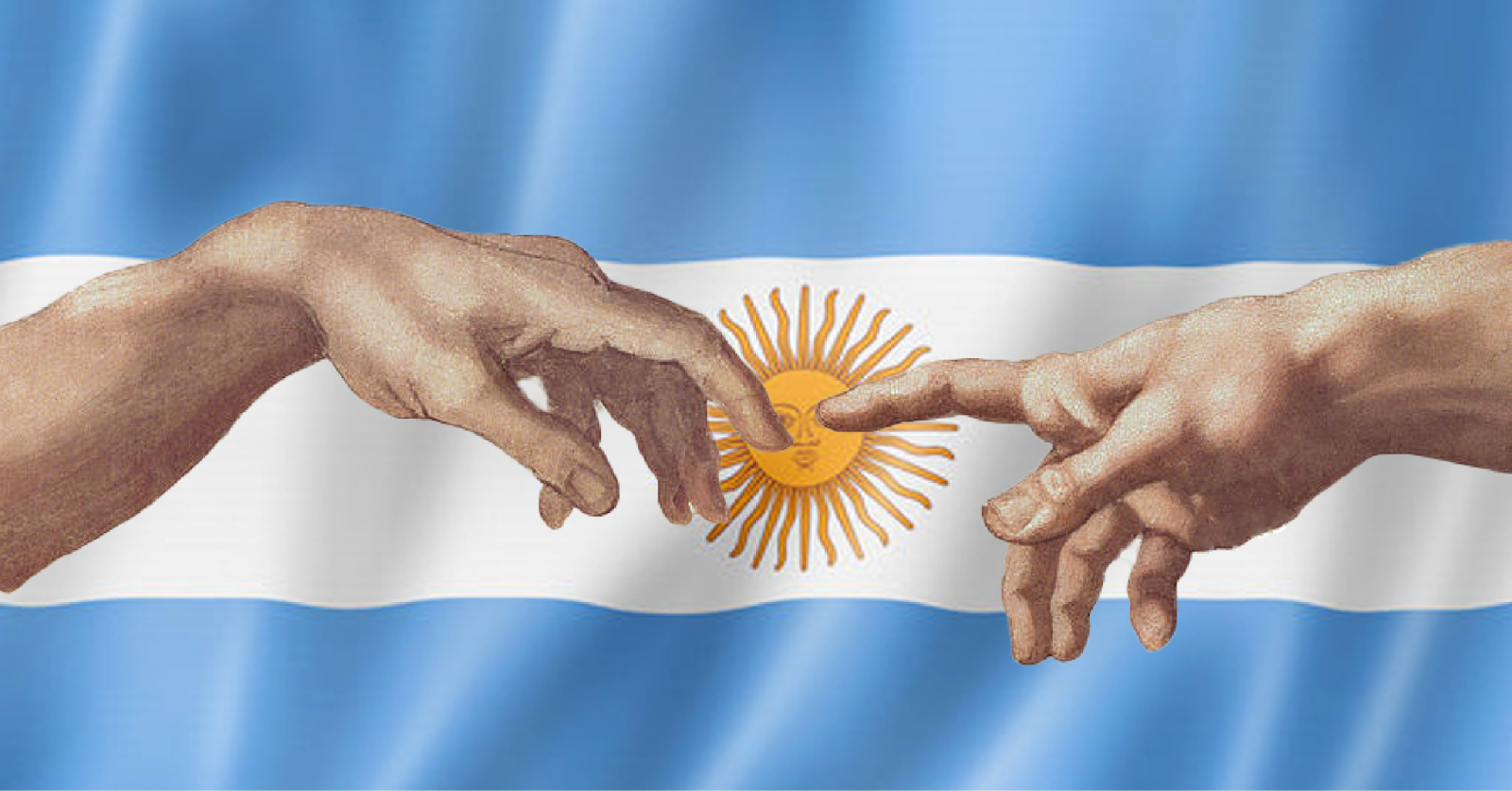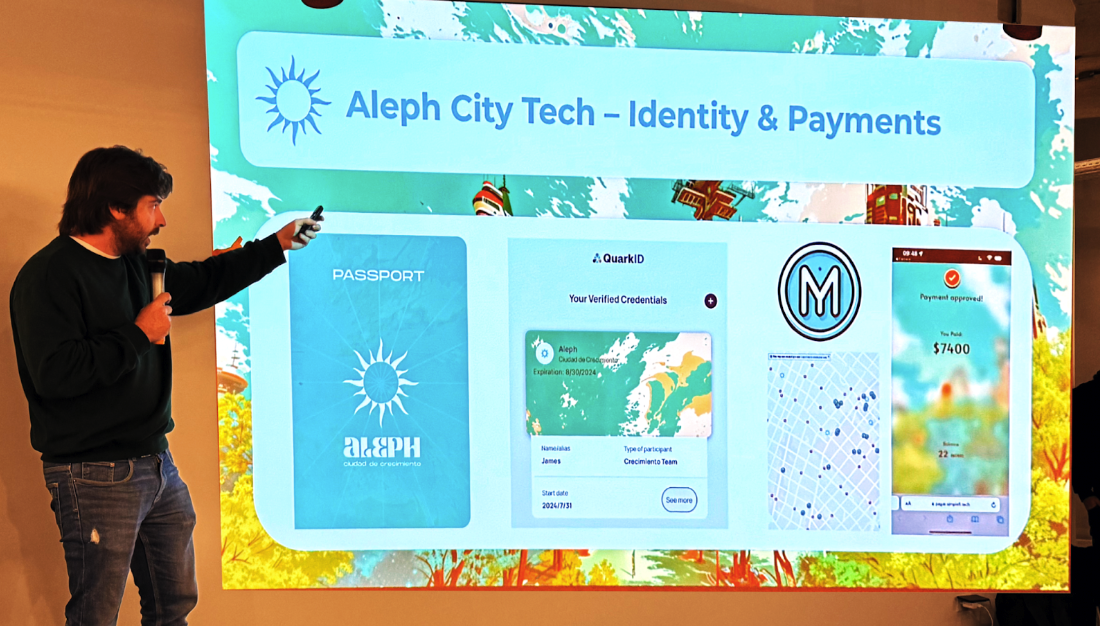Crecimiento & Aleph: Argentina's Crypto Moment

Dear Bankless Nation, I spent all of August in Argentina, attending ‘Aleph’ – a crypto pop-up city in the heart of Buenos Aires.
Aleph is one part Zuzalu, one part Devconnect. Significant top-down support and coordination from Protocol Labs was met with hundreds of volunteers, community leaders, and ecosystem partners who took up arms to create an environment to foster the next generation of crypto startups in Argentina.
At the Aleph Hub, a 1,000-person co-working space, crypto startups, venture capitalists, and the Argentine government all met and mingled for a month of collaboration, support, and growth.
While Aleph is a 1-month event that will come to an end, the sparks it ignites will hopefully grow into a wildfire across the country of Argentina and then all of Latam. This wildfire is ‘Crecimiento’ – growth.

Why Argentina?
Argentina is the spearhead of crypto.
While developed nation VCs and Crypto Twitter's degens hypothesize about use-cases, adoption, and ‘attracting retail investors.’ In Argentina, crypto has already been adopted by millions of people who have a present and urgent need for Crypto’s value and services.
Argentina is the perfect breeding ground for the crypto economy. The intersection of easy internet access, currency inflation, capital controls, and traditional business frictions has produced an environment where the power of crypto can truly shine.
This recent Gwart tweet made me chuckle, but the irony here is that in Argentina, millions of “well-adjusted adults with 9-5 jobs with monthly expenses and obligations” have all found crypto as a means to let them live better lives.
Retail is coming. You know, well-adjusted adults with 9-5 jobs with monthly expenses and obligations. They’re coming to trade digital commodities with us. That’s what they’re going to do. just be patient, retail is on their way.
— Gwart (@GwartyGwart) August 11, 2024
There is a stark difference between the crypto-economy of Argentina and the perceived ‘use-cases’ and ‘metas’ that are often hypothesized about on Crypto Twitter. Local Argentines can’t all afford to bet on the next shiny alt-L1 or be in the memecoin trenches; their money could be worth 1% less tomorrow and 1% less again the day after that.
Of course, Argentina has its own crypto-natives who play in the degen games, but degen activity is dwarfed by the millions of Argentine citizens who don’t care about crypto and the fake world that degens on Crypto Twitter have generated but nonetheless are using their favorite crypto app (Lemon, Belo, BuenBit, or Ripio) to escape inflation, buy coffee, and protect their wealth.
Meeting Argentine startups really makes the CT & VC crypto games seem so silly
— DavidHoffman.eth 🦇🔊 (@TrustlessState) August 13, 2024
- The 15th restaked supercharged AltVM L2?
- The 5,000th political memecoin?
- DePIN this, Crypto AI that
Nah, just real cash-flowing businesses serving millions of local Argentines https://t.co/BUex3s2l2q
In Argentina, crypto is real.
The Bottom-Up: 100 More Startups
While the government of El Salvador has been praised by Bitcoiners for its Bitcoin-forwardness, the citizens of El Salvador do not share similar excitement for the country's top-down investment into Bitcoin.
In contrast, the citizens of Argentina are truly excited about crypto or, at worst, indifferent. Certainly, not every Argentine uses crypto, but its usage is normalized and culturally accepted. The average Argentine has either directly had their lives materially improved by crypto due to easy access to dollars, payment services, and bankless banking, or they know someone with this experience.
The bottom-up support and acceptance of crypto is stronger in Argentina than anywhere else in the world.
A north star of Crecimiento and the Aleph pop-up city is the belief that Argentina is “100 good startups away” from a wildfire of crypto-enabled economic growth and prosperity spreading across the nation.
Just ~100 more startups, creating ~5,000 more crypto-powered jobs, bringing the value of crypto into Argentina… and Argentina could be the first country to reach crypto-escape velocity and become the first end-to-end crypto-powered country on Earth.
At Aleph, 67 crypto startups, from pre-seed to series A, are working together at a common co-working space, collaborating on problems and supporting each other along their journey. There, 22 mentors from venture capital firms, crypto teams, and successful entrepreneurs are present at the Hub, offering time, advice, and perspective in order to pass wisdom onto the younger generations of startups.
A score of high-profile speakers & experts came to speak with startups IRL each day during Aleph – from Seba Serrano (Ripio) to Alec Oxenford (OLX) to Nico Berman (Kaszek) to Marta Cruz (NXTP Ventures). Every day at the Aleph Hub, there was a university-level curriculum showcasing the skills needed to build in Web3. Workshops, talks, and mentorship were available – highlighting some of the industry's most technical frontiers.
A huge shoutout to ZKsync here – startup builders and hackathon attendees overwhelmingly cited the presence and support that the ZKsync team provided to Aleph. The 3rd week of Aleph was ‘ZK week,’ and the ZKsync LATAM Devrel team went above and beyond providing education in both English and Spanish for the builders here.
The Top Down: Milei’s Digital Transformation
Argentina is the only country on Earth that has a strong grassroots crypto industry, which is being met by a strong, top-down, pro-crypto state government.
This is the potential that Crecimiento is trying to unlock.
Argentina's new leader, Javier Milei, is, in many ways, deeply crypto in spirit. With this new administration making radical changes to the Argentine government, the country's crypto leaders see a path to permanently embed crypto in Argentina's growth plans for the next decade and beyond.
Milei is pro-technology, pro-investment, and pro-acceleration. He has an actual “blockchain consultant,” Sergio Morales, in his cabinet. Milei's interest in Bitcoin and crypto is part of his broader economic philosophy, which includes dollarizing the economy (stablecoins, anyone?) and reducing government intervention.
Milei drafted legislation that balances crypto-innovation and investor protections and has collaborated with the crypto industry to provide regulatory clarity. Part of Milei’s initial “economic mega-decree" included the elimination of legal tender laws, allowing contracts to be denominated in any currency.
These are good steps for the legality of crypto in Argentina, but there is still a long way to go.
The real challenge for the crypto industry here is whether Argentina can build a strong pro-crypto regulatory framework that gives crypto entrepreneurs assurances that crypto will be legal and protected for multiple decades. Can crypto protections be established that will transcend the current administration? What if a new administration comes and attempts to wipe out the pro-crypto progress that the Milei administration has made, as has happened so many times in the past for other industries in Argentina?
The Gary Gensler of Argentina - Roberto Silva - said at the @crecimientoar Regulation Day:
— DavidHoffman.eth 🦇🔊 (@TrustlessState) August 23, 2024
“We are 100% in favor of normalization of technology of the crypto world.”
"The SEC model is to sue cryptocurrencies, claiming they are irregular. We do not follow that model." pic.twitter.com/vIXOwYV6gp
On the 22nd of August, Aleph hosted ‘Regulatory Day,’ where leaders in the Milei administration came to the Aleph Hub for a day of discussions and workshops, all focusing on what crypto businesses and startups need from the Milei Administration.
It’s not just Milei. Here’s the previous president of Argentina walking in the Aleph coworking space.
.@zksync's ELI5 book on Zero Knowledge Proofs is for everyone.
— ZKsync (∎, ∆) (@zksync) August 23, 2024
Doesn't matter if you're the founder of @lemonapp_ar, a President of Argentina, or the innovation secretary for Buenos Aires.
Read it yourself 👉 https://t.co/fDFCeuJ9Ra pic.twitter.com/c3UH4cG5ku
This is like if Bill Clinton attended the ETH Denver hackathon.
Unlike in the United States, the crypto industry in Argentina is deeply appreciated and encouraged by state officials.

Aleph: The Network State
Aleph is pioneering crypto-native technology that's dog-fooded by the 2,300+ Aleph citizens!
QuarkID is an app incubated by the City of Buenos Aires that uses verifiable credentials, decentralized identifiers, and zero-knowledge cryptography to produce a user-sovereign identity system for all the citizens of Aleph.
After purchasing my ticket (citizenship) to Aleph, I was issued a verifiable credential that allowed my iPhone to open the door to the Aleph Hub and access the co-working space. My rights and privileges as a citizen of Aleph mean I get an allowance of 100 MORFI tokens per week.
MORFI tokens are an ERC20 token on ZKsync Era that are redeemable for 1,000 Argentine pesos at local businesses that have signed up to accept MORFI for payment for food, coffee, or other services around the Aleph Hub. One thousand pesos is about $1 (depending on when you're reading this). All of this is running on the ZKsync Era mainnet and represents a real prototype for a Baljian network state running on crypto rails.
Maybe you’re thinking, “How did they get over 50 different local businesses to accept crypto for payment?” The sales pitch is pretty easy when you learn that accepting regular peso payments over fintech rails results in a 2-3 month settlement time… meaning businesses don’t get their Pesos until they've lost a significant portion of their value.
Last month, Argentina experienced its lowest month of inflation in over five years, at 4%. That's 4% in a month, not a year. You think 2.9% credit card fees are bad? Imagine a business losing 10% due to currency debasement simply because the banking rails hold their money for months before giving it to the businesses. When Argentine businesses are informed that they are able to get their money instantly, it’s an easy sell.
Later this year, QuarkID will build its own independent Elastic Chain on the ZK Stack and be a part of the ZKsync Hyperchain. QuarkID has plans to build more traditional services into their app, from driver's licenses and other government-issued credentials to user-controlled wallets. For all intents and purposes, this would become the Argentina L2.
If you want to go further down this rabbit hole, check out the interview I did with Diego Fernandez, the Secretary of Innovation of Buenos Aries, last January.
Conclusion
As Aleph comes to a close, the gringos, VCs, and mentors will all have to leave. We all have homes to return to. The Aleph co-working space is on a three-year lease and will remain open for Crypto startups to use as a common hub for the crypto industry moving forward. Support networks have been created, and connections, friendships, and investments have been made.
Will Aleph be the final push over the edge for the crypto industry in Argentina?
BREAKING:
— Bankless (@BanklessHQ) August 23, 2024
Ethereum and Solidity are now formally integrated into high school education programs in Buenos Aires
High schools students will learn to write #Ethereum smart contracts
Vamos Argentina! 🇦🇷 pic.twitter.com/i3Wz5OrFEq
Argentina certainly has more than its fair share of problems to deal with. There's the convoluted taxation system that even regulators know means rampant tax-dodging. There are business registration constraints. This, not to mention decades of entrenched pseudo-communism that have held millions of voters locked in poverty and government handouts.
But if there’s one thing that has consensus in Argentina, it's that the homegrown, grassroots crypto industry is one of its brightest stars on the horizon. While many Argentines that I know have become fantastically wealthy thanks to the fortunes of crypto, many of them are committed to staying in Argentina. They love Argentina and its people. It’s not a place to escape, but a culture worth experiencing and a country trying to become worthy of reinvestment.
I don’t know if crypto can single-handedly elevate Argentina, the jurisdiction, into a higher quality of living, but we’ve already seen crypto elevate millions of Argentines out of poverty and free them from currency debasement.
Perhaps the governments in the modern age are simply too calcified to rebuild productively. That’s sad but fine.
Crypto can help people help themselves, regardless of whether their country can. And if their country can help crypto along as well, that’s even better.